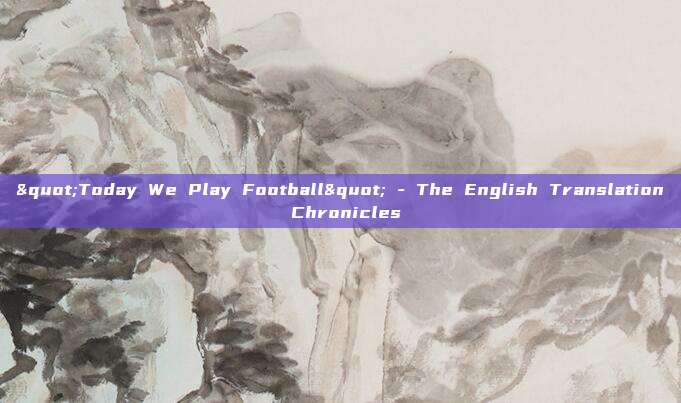**"Today We Play Football" – The English Translation Chronicles**

---
### The Whistle Blows: A Tale of Two Cultures
In a world where the beautiful game is the universal language that needs no translation, there is one phrase that transcends borders and unites millions: "Today we play football." Yet, beneath this simple declaration lies a complex web of cultural nuances, linguistic subtleties, and historical legacies. This is not just a story about a game. It's a chronicle of how words can bridge divides or deepen them, depending on who holds the pen.
---
### **The Field of Dreams: Where Words Meet Grass**
Imagine a stadium filled with fans from every corner of the globe, each speaking a different language but sharing a common passion. As the players step onto the pitch, they are greeted by a cacophony of cheers and chants, all united under the banner of football. In the heart of this scene, a translator stands at the center, tasked with conveying the spirit of the game in a way that resonates with everyone present.
"Today we play football" – these words carry the weight of expectation, the promise of glory, and the thrill of competition. For some, it evokes memories of childhood games played under the scorching sun, while for others, it conjures up images of cold, rainy afternoons spent cheering from the sidelines. Each culture brings its own flavor to the phrase, enriching the tapestry of the global football community.
---
### **From the Sidelines: The Art of Translation**
Translation is often seen as a straightforward process of converting words from one language to another. However, when it comes to capturing the essence of a phrase like "Today we play football," the task becomes much more nuanced. Translators must navigate the subtle differences in meaning and connotation across languages, ensuring that the spirit of the original message remains intact.
For example, in Spanish-speaking countries, the phrase might be translated as "Hoy jugamos fútbol," which carries a slightly different tone due to the grammatical structure of the language. In German, "Heute spielen wir Fußball" might be used, but the word "Fußball" itself is a loanword borrowed from English, highlighting the complex interplay between languages in the world of football.

---
### **Beyond the Pitch: Cultural Significance**
Football is more than just a sport; it's a reflection of culture and identity. The phrase "Today we play football" takes on new meanings when viewed through the lens of different societies. In some countries, it symbolizes national pride and unity, while in others, it represents a form of escape from daily struggles.

Consider the passionate fans of South America, where football is almost a religion. Here, the phrase embodies the spirit of camaraderie and the joy of collective celebration. Contrast this with the reserved nature of some European supporters, where the game is appreciated for its tactical brilliance and the beauty of skillful play. Even within individual nations, regional variations in dialect and slang can alter the way the phrase is perceived and used.
---
### **The Referee’s Call: Challenges and Triumphs**
Translating "Today we play football" into multiple languages is not without its challenges. One of the most significant hurdles is maintaining the emotional impact of the phrase across cultures. What works in one context may fall flat in another, requiring translators to be both linguists and cultural ambassadors.
Moreover, the rapid pace of the globalized world means that new phrases and idioms emerge constantly. Keeping up with these changes requires a deep understanding of the evolving landscape of football and the communities that support it.
Despite these challenges, there are countless examples of successful translations that have captured the heart of the game. From the iconic "Jogo Bonito" (Beautiful Game) in Brazil to the poetic "Das Spiel des Lebens" (The Game of Life) in Germany, translators have found ways to convey the essence of football in a way that resonates with fans around the world.
---
### **The Final Whistle: Unity in Diversity**
As the final whistle blows and the crowd disperses, the true power of "Today we play football" becomes clear. It is not just a call to action but a rallying cry that unites people from all walks of life. Through the shared experience of watching and playing the game, barriers dissolve, and differences fade away.
In the end, the phrase serves as a reminder of the universal appeal of football. It is a testament to the enduring human spirit and our capacity to find common ground, even in a world that often seems divided. Whether you're a seasoned professional or a young child dreaming of glory, the words "Today we play football" hold the promise of something greater – a world where differences are celebrated, and unity prevails.
---
As the sun sets over the stadium, the lights dim, and the echoes of the game fade into the night, the legacy of "Today we play football" lives on. It is a phrase that will continue to inspire generations to come, reminding us all that, no matter where we are or who we are, we share a common bond – the love of the beautiful game.





